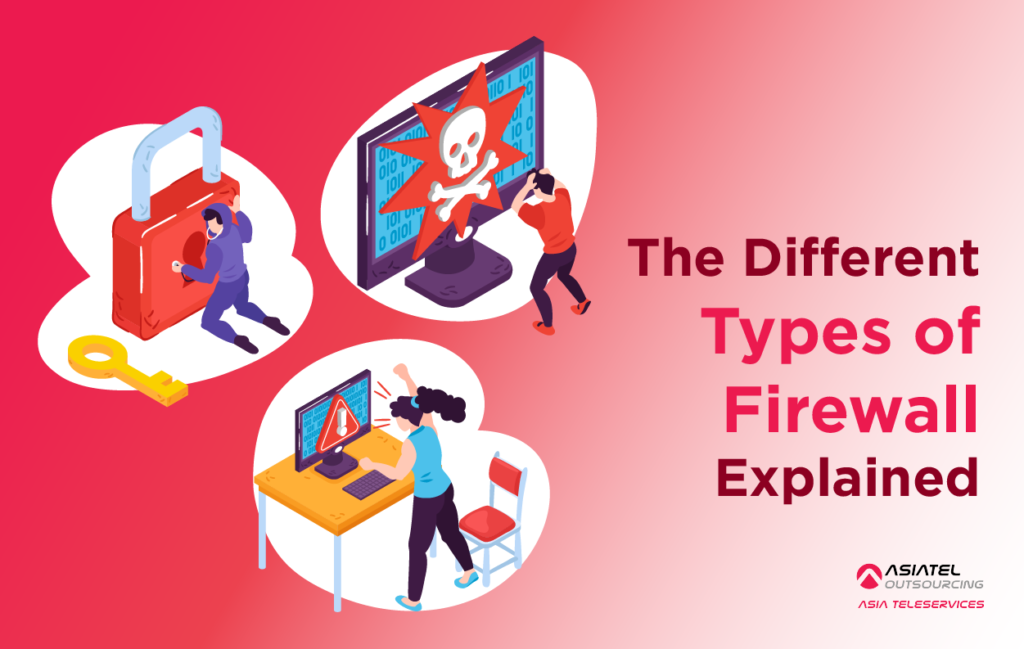
It is in the 1960s when the internet is first introduced to the world. Since then, it has brought dramatic changes in our daily lives. With the entertainment it brings at home and the convenience it lets us experience at work, surely, the internet deserves a perfect spot on everyone’s necessity list, but with all its benefits, the internet is filled with risks, too. We may be prone to abuse, data leaks and unauthorized file access.
Grateful we have firewalls.
In this post, we will be discussing the different types of firewalls. These types of firewalls are guaranteed to save you and your business from cyber attacks.
Firewall Defined
As per TechTerms, “A firewall acts as a barrier between a trusted system or network and outside connections, such as the Internet.”
A firewall halts any software installed on your computer from dispersing data using the web. This as well prevents outsiders from getting access to information stored on your server.
The Different Types of Firewalls
- Packet-filtering Firewall
The Traditional Network Firewall or Packet-filtering Firewall is a firewall technique developed to control access to a network by filtering outgoing and incoming data packets using a set of security protocols. The protocols applied will prompt the firewall whether to permit or deny the entry of these packets to the network. (e.g. allowing data only from certain IP addresses, data packet type and ports, and ignore those that didn’t matched the criteria. )
A Packet-filtering firewall solution can be built at a very low cost as most devices on a network are capable of being one. This includes routers, Virtual Private Network (VPN) concentrators and switches. Though its protection level is considered high, the effectiveness of this type of firewall varies on the set of security protocols applied. The set of rules, if outdated might allow unauthorized traffic to enter the network.
- Web Application Firewall
Web Application Firewall (WAF) is another type of firewall that creates a shield between a web application and an internet user. When an external user starts accessing a corporate application, Web Application Firewall accepts the data coming from the user and then creates its own connection on the user’s behalf.
WAF protects website applications against targeted attacks which may result in fraud and theft. This firewall can be highly beneficial to web-based businesses that involve interaction with external users such as e-commerce sites and other online services.
- Next-generation Firewall
Next-generation Firewall (NGFW) is a strengthened version of the traditional firewall. Both the NGFW and the traditional firewall may have the same purpose, to block unauthorized traffic from entering a network but the Next-generation Firewall (NGFW) works in a bit different way.
Rather than just filtering and blocking ports and IP addresses, the NGFW protects a network from unwanted traffic by using deep packet inspection to identify the contents of each incoming data packet. NGFW also includes additional features the traditional firewall can’t offer- application awareness, cloud-delivered threat intelligence and intrusion prevention. More expensive than the traditional firewall since the benefits garnered when using anti-viruses and various security apps are already integrated into the NGFW.
- Database Firewall
Corporate information, when accessed by attackers is indeed a great loss to any business, and to prevent this, a special type of firewall is established to monitor all commands and connections to the databases, Database Firewall.
Database Firewall is designed to identify threats and protect sensitive information stored in the databases. This firewall is installed either just before or in front the database server, or the network gateway. Database Firewall comes with a set of security protocols that has the ability to determine threats based on previous attacks, but some attacks on the database may not be familiar at all. With this, the Database Firewall comes up with a list of secured commands and all the incoming commands will be compared to the said list.
Choosing the Right Type of Firewall for your Business
Technology improves every single day. It brings us all the opportunity to do our jobs in its easiest ways, but besides us, this is also taken advantage of by cyber criminals. No firewall architecture, no matter how modern and expensive will ever be enough to protect us. Instead of asking yourself the right firewall to choose, perhaps you should ponder first if you would only use one.
Sources:
